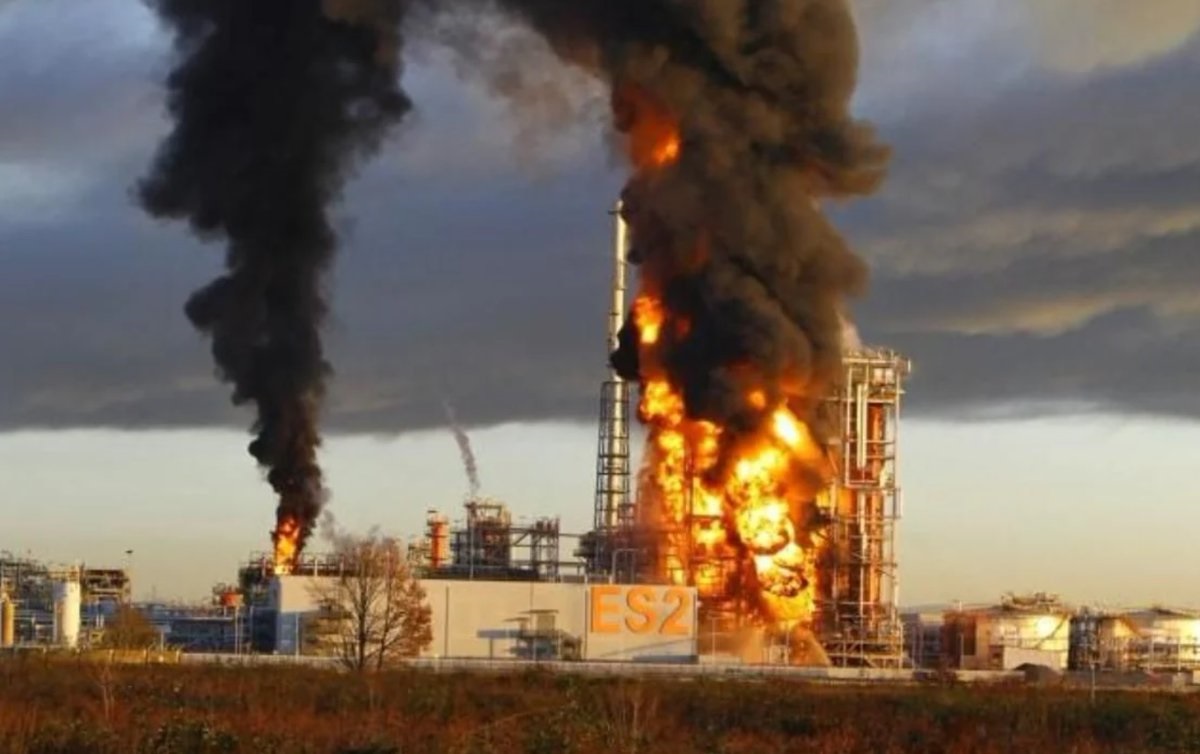For several months in a row, Ukraine has been attacking the Russian fuel and energy complex. Persistent attacks on Russia's fuel and energy infrastructure have caused substantial financial setbacks for the aggressor, exacerbating fuel shortages within the Russian military. On March 22, the Financial Times reported that the United States purportedly urged Ukraine to refrain from targeting Russian oil refineries and energy facilities, citing concerns over escalating fuel prices and potential retaliation from Russia. Whether this is true and what Ukraine should do in the absence of American aid, if it is true, read in the article Apostrophe.
Recently, Ukrainian drones attacked several Russian refineries, which caused serious consequences. On the morning of March 12, after the impact, a fire broke out at one of the largest refineries in Russia - Nizhny Novgorod. On March 13, Ukrainian drones attacked the Ryazan Oil Plant, causing a fire there. On the same day, due to a drone attack, the Novoshakhtynsk Refinery, which supplies fuel to the south of Russia, suspended its work.
Russian publications report that Ukrainian assaults on Russian oil refineries have spurred a rise in gasoline prices. On March 14, the price of AI-95 gasoline surged by 1.88%, hitting 60,569 rubles ($658) per ton for the first time in six months. By March 22, the price had escalated further to 66,421 rubles per ton ($721).
The price surge is attributed to drones disrupting roughly one-sixth (16%) of Russian automobile fuel production. On average, this translates to monthly losses of approximately 0.7 million tons of gasoline and 1.1 million tons of diesel fuel for oil refineries.
Russian ‘military correspondents,’ who are essentially propagandists, are lamenting the shortage of fuel at the front lines in their publications.
‘The cause of the PMM shortage is evident - the adversary has disrupted operations at several refineries within Russia. Priority is being accorded to the civilian sector, ensuring that urban residents accustomed to driving their cars do not experience discomfort or exhibit negative sentiments towards the authorities,’ one of Z-writes whines.
America opposes?
The US has urged Ukraine to refrain from targeting Russian oil refineries and energy infrastructure to prevent fuel price hikes and potential retaliation from Russia, according to the Financial Times citing three sources.
According to sources cited by the newspaper, Washington allegedly conveyed repeated warnings to high-ranking officials from the Security Service of Ukraine (SBU) and the Main Intelligence Directorate (GUR).
As reported by the Financial Times, despite sanctions, Russia remains one of the largest fuel suppliers. Consequently, global oil prices surge due to frequent strikes on the Russian energy system. Washington is concerned as this occurs at the start of Joe Biden's election campaign.
Additionally, the US acknowledges that Russia may retaliate by targeting Ukraine's energy infrastructure.
However, the Ukrainian government asserts that it does not agree with the Americans.
‘After two years of full-scale war, no one will dictate terms to Ukraine on how to conduct this war. Under international law, Ukraine can ‘degrease’ Russian war instruments. Fuel is a fundamental tool of warfare. Ukraine will disrupt fuel infrastructure,' Mykhailo Podolyak, adviser to the head of the office of the President of Ukraine, said on the air of the Russian TV channel Dozhd.
Commenting on the Financial Times article, Deputy Prime Minister Olga Stefanishyna effectively confirmed Washington's intentions: ‘We understand the calls from our American partners. At the same time, we are fighting with the capabilities, resources, and practices that we have today.’
Who is to blame and what to do?
‘While Americans may not have directly informed us, there's a possibility they hinted at the risks through publications like the Financial Times, merely highlighting the potential consequences’, Volodymyr Volya, the international expert, suggests.
According to the expert, Ukraine's actions targeting Russian oil refineries will impact fuel prices, including those within Ukraine itself.
‘Strikes on oil refineries are highly sensitive for Putin, and I'm confident that an attack on Ukraine's energy infrastructure are Putin's retaliation,’ Volya sais.
‘Russian groups have begun lamenting issues with diesel supply in their military. Simultaneously, Western media reports suggest that the US government is urging Ukraine not to target Russian oil refineries. One hopes that the visit of security advisor Jack Sullivan and the strikes on our energy sector by aggressors aren't part of a 'peace enforcement' operation. Perhaps the Financial Times publication is just a red herring,’ noted political analyst Yaroslav Makitra.
‘Russia remains a significant and influential player in the energy supply market. The drone strikes have resulted in a reduction in processing capacity from 600,000 to 900,000 barrels per day, a substantial loss of about 10-12% in oil processing capabilities for Russia. However, a 10-15% loss in processing capacity doesn't automatically translate to a corresponding increase in oil prices. There's no direct impact. It's about broader trends that hold significant market importance. From a political standpoint, fuel prices are crucial for the Americans, serving as a gauge of the White House administration's effectiveness. If prices hypothetically rise, Americans would naturally be disappointed with Biden, possibly leading to a shift in support towards his competitor, namely Trump,’ the expert says.
As Andriy Miselyuk, director of the Institute of Social and Political Design ‘Dialog’, noted on Apostrophe TV, it is very important for the White House to maintain control over the world oil market.
‘Therefore, representatives of the Biden administration are interested in maintaining stability in the oil market. Oil prices on the global market have fallen because a UN resolution on a ceasefire in Gaza has been registered. This will influence the decisions of the Houthis regarding the blocking of tankers in the Red Sea. Thus, the market is currently in a nervous and tense state due to events in the Middle East. While Ukraine's successful actions against Russian oil refineries may serve as an additional incentive for market destabilization, they are by no means the primary factor,’ Myseliuk believes
Meanwhile, President of the Center for Global Studies "Strategy XXI," Mykhailo Honchar, views the publication in the Financial Times as a Republican ploy, citing several reasons for this assertion.
‘The decline in U.S. strategic oil reserves has prompted market players to swiftly drive up prices to profitably supply resources for reserve replenishment. Meanwhile, domestic gasoline prices in the U.S. have also risen slightly, by a few cents per gallon, largely due to ongoing repairs at several American refineries, Honchar says.
"American oil magnates traditionally lean towards supporting Republicans. I wouldn't rule out the possibility that some refinery owners may expedite maintenance schedules to artificially inflate prices, thus potentially contributing to the failure of the Biden administration in the elections," he believes.
"What should we do? It's a complex question, and I don't have all the answers. Republicans deliberately delay aid and constantly come up with reasons to withhold it, prolonging the situation until the elections, aiming to defeat Biden in this way," Volya concludes.
Yaroslav Makitra suggests making conclusions later and observing how the situation unfolds.
‘What's next? Will the Americans, as they have done several times before, once again bail out Russia from hunger? Only this time, instead of 'Bush legs' (chicken meat supplied from the West to Russia in the 1990s - Apostrophe), will they be sending cans of diesel? Analysis of the situation will be possible as events unfold,’ the expert concludes.






